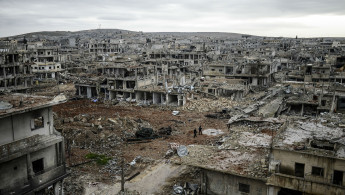Sexual violence a tool of terror in Syria's war
The UN Security Council's report on conflict-related sexual violence was published in late April and covers the period from January to December 2016.
In the report, the term 'sexual violence' refers to sexual slavery, rape, forced prostitution, forced pregnancy, forced abortion, enforced sterilisation, forced marriage, and other forms of sexual violence committed against women, men, girls, and boys.
The report focuses on both the regime and Islamic State group, whose crimes against Yazidi women in Iraq have been well-documented.
After declaring a "caliphate" across Iraq and Syria in 2014, IS committed mass rape and sexual enslavement against the Yazidi minority, with Sunni women under IS-rule claiming arbitrary detention, beatings, forced marriage, and rape were commonplace.
While 971 women have been freed by IS, at least 1,882 remain enslaved, the UN report says.
 |
While 971 women have been freed by IS, at least 1,882 remain enslaved |  |
The report also focused on the use of sexual violence by the Syrian regime of Bashar al-Assad against opposition areas and activists.
"Women and girls have been most vulnerable in the context of house searches, at checkpoints, in detention facilities, after kidnapping by pro-government forces, and at border crossings," the UN report says.
"Men and boys have been subjected to sexual violence during interrogations in government run detention centres."
Sexual violence in Syria's brutal regime prisons is commonplace, according to a report this year by Amnesty International.
Guards routinely rape detainees, while freed prisoners testify to having been forced to strip naked and ordered to rape one another under the threat of death.
 |
Men and boys have been subjected to sexual violence during interrogations in government run detention centres |  |
'Rape part of regime policy'
In March, a report by the London School of Economics' Centre for Women, Peace and Security detailed the systematic use of sexual violence by pro-regime forces.
"Rape in the Syrian conflict has not been an opportunistic or isolated crime but a part of the government's repression policy," the report's author Marie Forestier told Syria Deeply.
Rapes often occur at checkpoints, in-between interrogations in prisons, and during military offensives on opposition strongholds, Forestier said.
The use of rape was premeditated and demonstrated a high level of organisation by Syrian security forces.
Testimonies from regime run prisons recount that security agents distributed contraceptive pills to detainees every day, Forrestier said. Others who became pregnant received forced abortions.
The use of sexual violence by Syrian government forces has been a tool of fear since the beginning of the revolution.
 |
Security agents distributed contraceptive pills to detainees every day... Others who became pregnant received forced abortions |  |
In May 2011, the torture and killing of 13-year-old Hamza al-Khateeb became a symbol of the uprising against Bashar al-Assad.
The young boy was detained by regime security forces east of Daraa and his mutilated body returned a month later to his family.
His body had multiple gunshot wounds and bruises, while his neck was broken and his penis had been cut off.
"I call on all parties to the Syrian conflict to immediately cease the use of sexual violence as a tactic of war or terrorism," UN Secretary General António Guterres said in the report.
He added that such crimes must be "taken into account in ceasefire agreements, political negotiations, peace processes and accountability initiatives."



